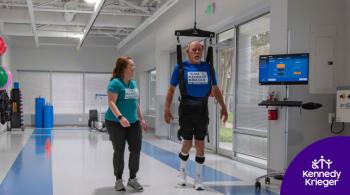BALTIMORE, February 8, 2022 – The Centers for Disease Control (CDC), in collaboration with the American Academy of Pediatrics (AAP), recently revised the milestone guidelines for their developmental surveillance campaign, Learn the Signs. Act Early. (LTSAE), using the help of experts across the country including a developmental pediatrician and researcher from Kennedy Krieger Institute.
The revised milestones are written in family-friendly language and identify the behaviors that 75 percent or more of children can be expected to exhibit at a certain age based on existing data, developmental resources, and clinician experience. This differs from other traditional lists of milestones, including earlier LTSAE checklists, which used 50th percentile or average-age milestones.
Pediatrics, an AAP journal, published an article today, “Evidence-Informed Milestones for Developmental Surveillance Tools,” which details the process behind the revised guidelines.
Using average age of achievement means that only half of children can be expected to achieve that milestone by that age. However, clinicians reported that following the former milestones often was not helpful to individual families who had concerns about their child’s development; in some cases, it led to delays in diagnoses as clinicians and families chose a wait-and-see approach.
“The earlier a child is identified with a developmental delay the better, as treatment as well as learning interventions can begin,” says Paul Lipkin, MD, who provides clinical services to patients at the Institute’s Center for Development and Learning and is a professor of pediatrics at The Johns Hopkins University School of Medicine. He assisted with LTSAE’s revisions. “At the same time, we don’t want to cause unnecessary confusion for families or professionals. Revising the milestones with expertise and data from clinicians in the field accomplishes these goals. Review of a child’s development with these milestones also opens up a continuous dialogue between a parent and the health care provider about their child’s present and future development.”
Other key changes to the milestones include:
- Adding milestone checklists for ages 15 and 30 months; now there is a milestone checklist for every well-child visit from ages 2 months to 5 years
- Identifying additional social and emotional milestones (Example: Smiles on their own to get your attention, age 4 months)
- Removing vague language like “may” or “begins” when referring to certain milestones and using plain language instead
- Removing duplicate milestones
- Providing new, open-ended questions to use in discussion with families (Example: Is there anything that your child does or does not do that concerns you?)
- Revising and expanding tips and activities for developmental promotion and early relational health
In addition to providing a better surveillance tool to identify developmental delays, LTSAE educates families about typical development and provide parents conversational entry points to discuss their child’s health and development with their pediatrician. After the revised milestones were completed, they were presented to parents of different educational backgrounds, income levels and racial groups to determine how easy they were to understand and follow.
The LTSAE awareness campaign began in 2005 and since then has provided free resources to families, healthcare providers, early childhood educators and others to support early identification of children with developmental delays and disabilities.
About Kennedy Krieger Institute:
Kennedy Krieger Institute, an internationally known nonprofit organization located in the greater Baltimore-Washington, D.C., region, transforms the lives of more than 25,000 individuals a year through inpatient and outpatient medical, behavioral health and wellness therapies; home and community services; school-based programs; training and education for professionals; and advocacy. Kennedy Krieger provides a wide range of services for children, adolescents and adults with diseases, disorders and injuries that impact the nervous system, ranging from mild to severe. The Institute is home to a team of investigators who contribute to the understanding of how disorders develop, while at the same time pioneering new interventions and methods of early diagnosis, prevention and treatment. Visit KennedyKrieger.org for more information about Kennedy Krieger.
###















